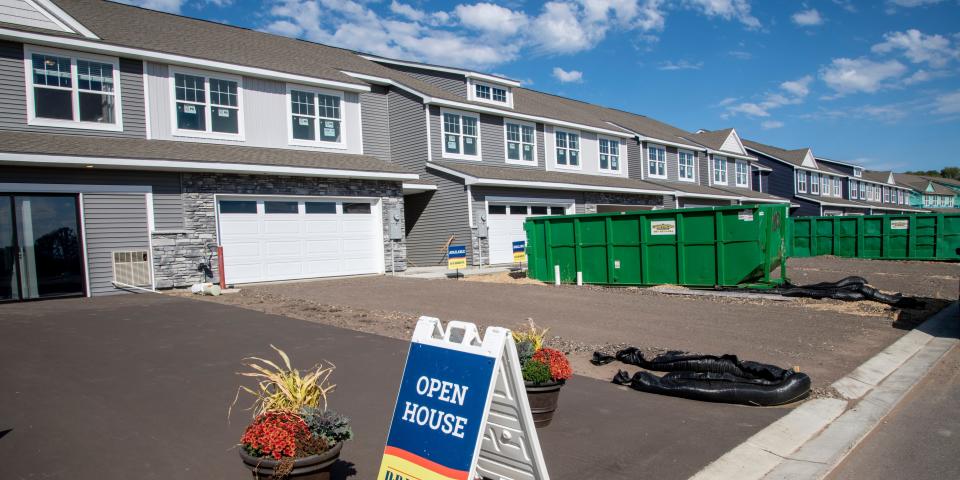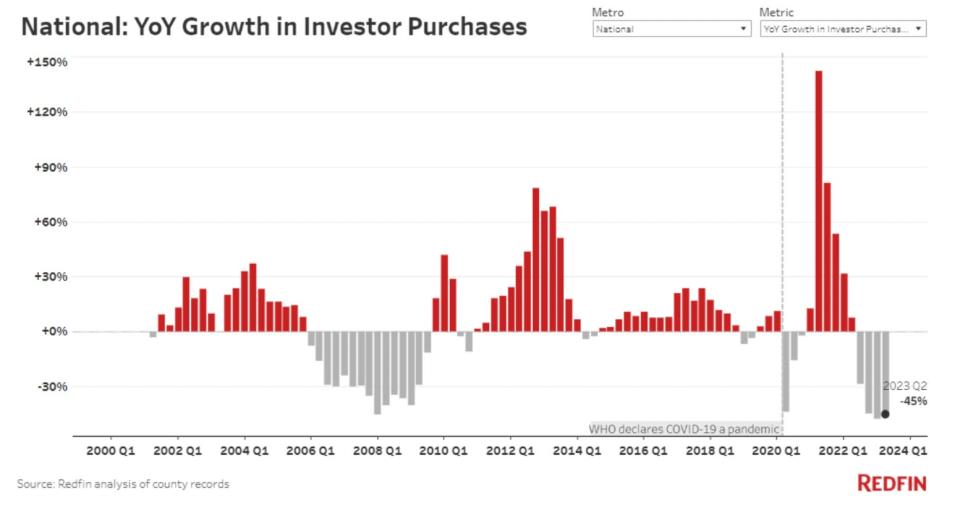The housing market is stuck: Americans can't afford homes, investors aren't buying property, and economists see little relief ahead

Low inventory, high mortgage rates, and high prices have created a difficult housing market.
Homeowners have seen equity climb, but house hunters are having a hard time breaking into the market.
Purchases by real estate investors plunged 45% in the second quarter compared to last year.
It's a tough time to be navigating the US housing market.
Low inventory, high mortgage rates, and high prices have put the housing market into a state of unaffordability that's weighing on house hunters, current homeowners, and even real estate investors.
The Federal Reserve's aggressive interest rate hikes over the last 18 months have led to mortgage rates hovering around two-decade highs, but so far home prices haven't fallen as they usually do when rates climb.
Throw in distorted supply and demand dynamics and economists see little reason to expect easing affordability. Current homeowners are reluctant to move and risk giving up lower rates they secured before, and that keeps homes off the market and leaves buyers with fewer options.
As things stand, roughly one-quarter of homeowners are sitting on mortgage rates of less than 3%, near the highest on record.
High home prices
The Case-Shiller US National Composite Home Price Index showed home prices climbed for the fifth straight month in June, and now the index is just 0.02% below the all-time high reached last summer. The seasonally-adjusted data showed prices climbed in every single city in the group's 20-city index.
"As we've noted previously, the recovery in home prices is broadly based," Craig J. Lazzara, managing director at S&P DJI, said. "Over the last 12 months, 10 cities show positive returns. Otherwise said, half the cities in our sample now sit at all-time high prices."
A recent Redfin survey found that young adults in particular are facing headwinds. Thirty-eight percent of buyers under 30 in a survey said they had to rely on family to help afford a down payment, in the form of either cash or inheritance. The stat led Redfin chief economist Daryl Fairweather to label the cohort as "nepo-homebuyers."
To that point, Americans are contending with the most expensive starter homes ever. The median sale price for the typical starter home hit an all-time high of $243,000 in June.
Soaring prices are even making it tough for those with deeper pockets. A separate Redfin report found that real estate investors bought 45% fewer homes in the second quarter compared to a year ago.
That outpaced the 31% overall dip in home sales, and signified the biggest drop since 2008, excluding the first quarter of this year.

"Offers from hedge funds have dried up; I haven't received an offer from one in a long time, except unrealistically low offers," Las Vegas Redfin agent Shay Stein said. "From mid-2020 until early 2022 when interest rates started going up, hedge funds bought up a ton of properties and immediately turned them into rentals, pricing out local buyers. Now a big portion of our homes are owned by investors, but they're not adding to their portfolios."
No relief in sight
Zillow's latest forecast says home prices could climb another 6.5% by July 2024, and data from Realtor.com showed total home listings just dropped for the fourth consecutive month in August, suggesting elevated prices will persist.
The report also showed that home sellers were less active in August, with 7.5% fewer newly listed homes compared to the same time last year. Inventory in the largest 50 metros, Realtor.com said, remains 45% below pre-pandemic levels.
Meanwhile, the latest mortgage delinquency data also suggests widespread price declines aren't on the horizon. Fannie Mae reported serious delinquencies fell to 0.54% in July from 0.55% in June — the lowest rate since before the housing bust of 2008 and also below the pre-pandemic low of 0.60%.
"Since lending standards have been solid and most homeowners have substantial equity there will not be a huge wave of single-family foreclosures this cycle," veteran real estate commentator Bill McBride wrote in an August 28 note. "This means that we will not see cascading price declines like following the housing bubble."
Read the original article on Business Insider
